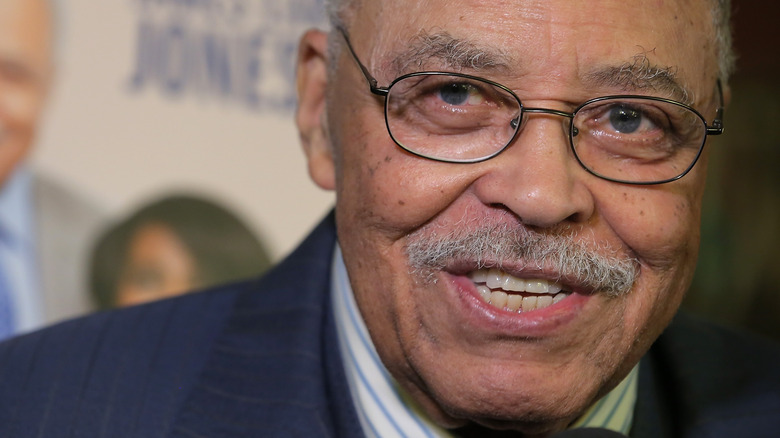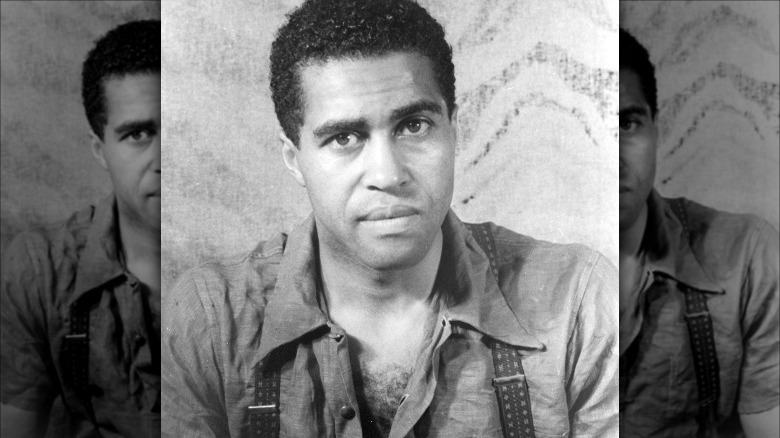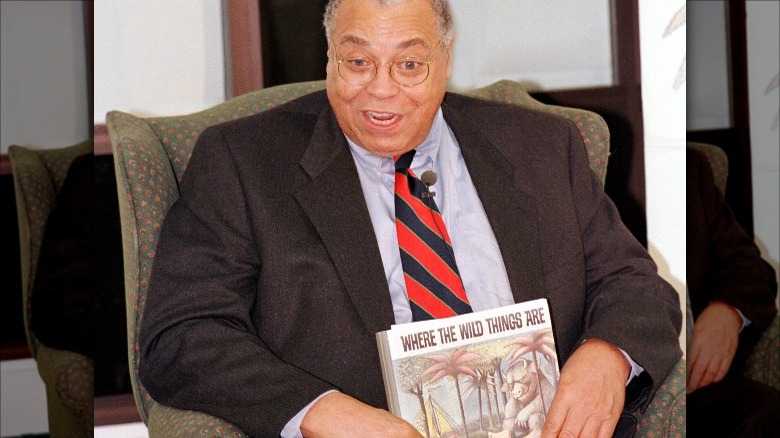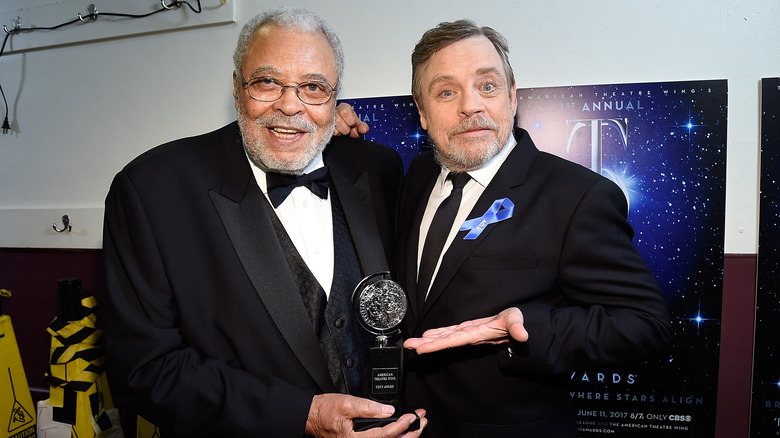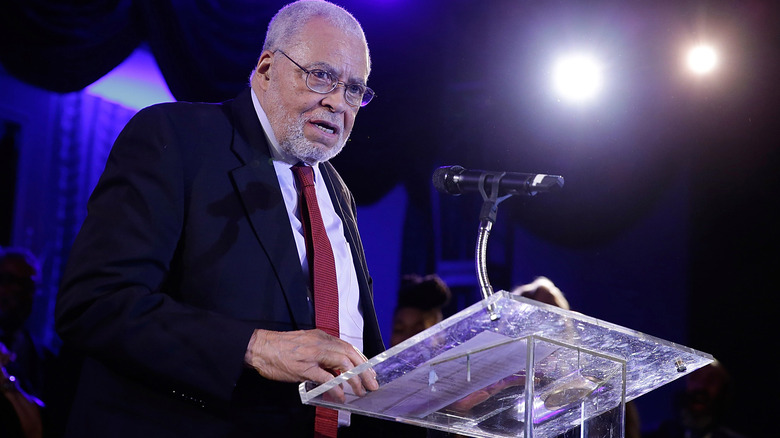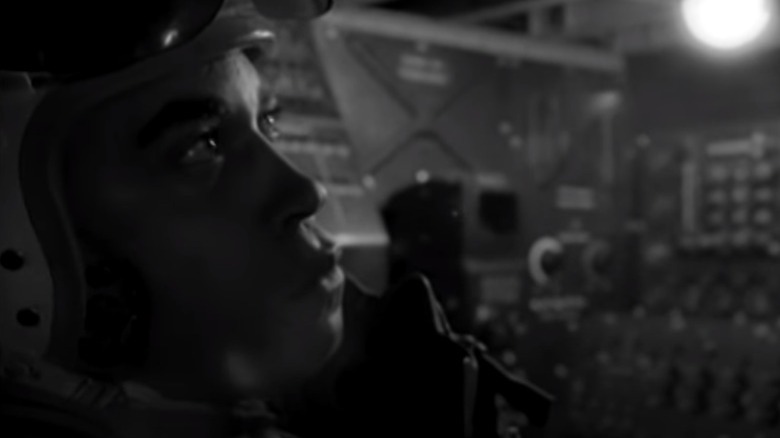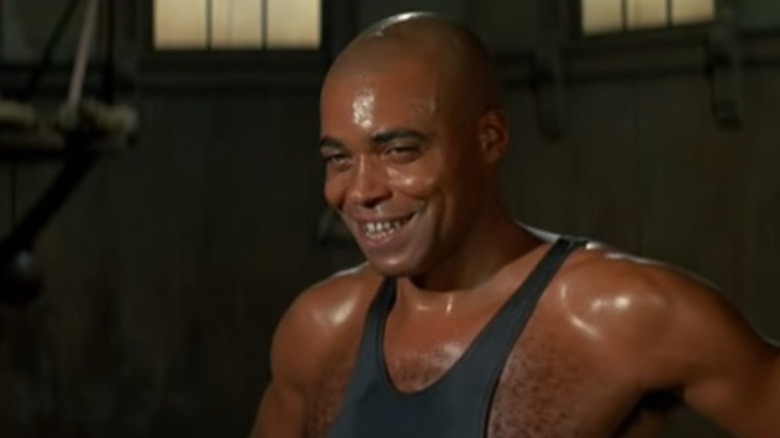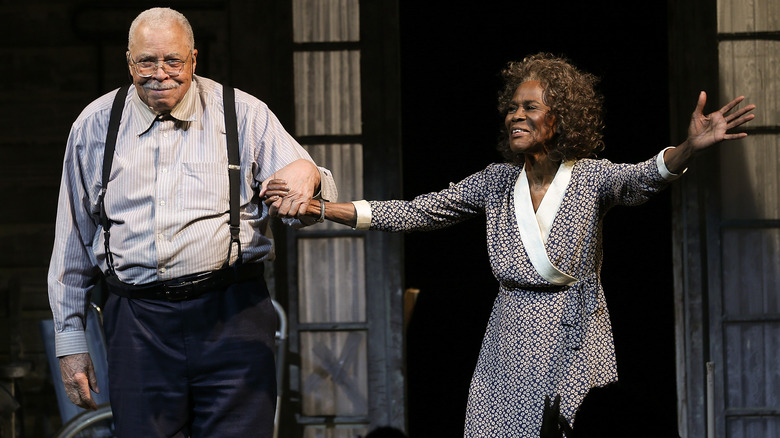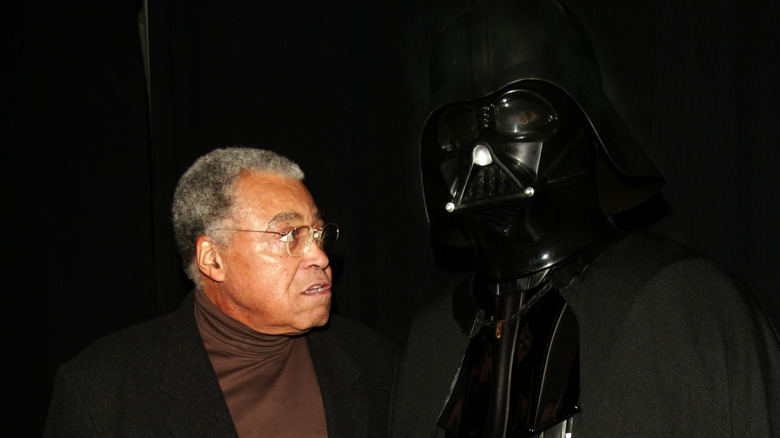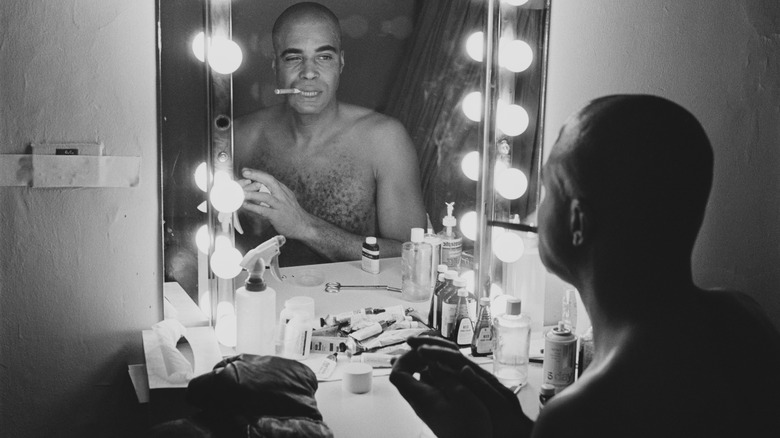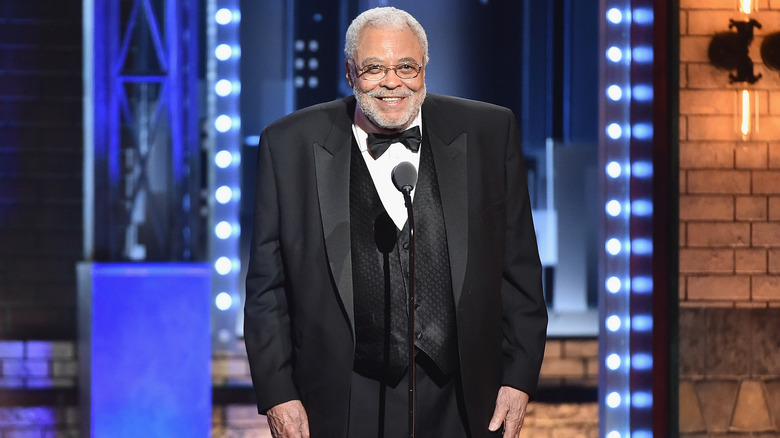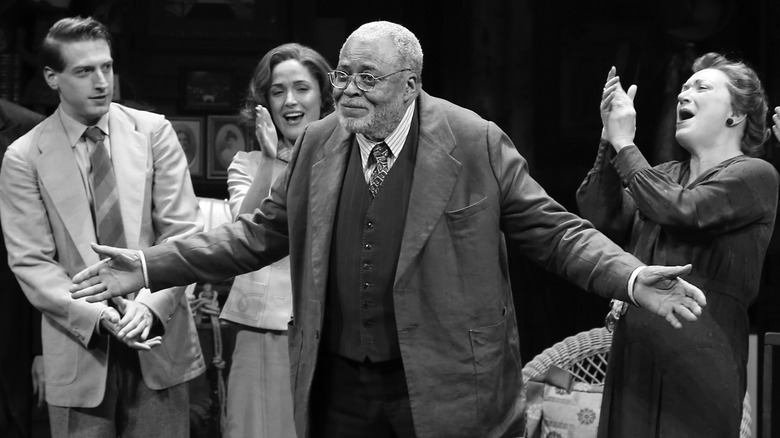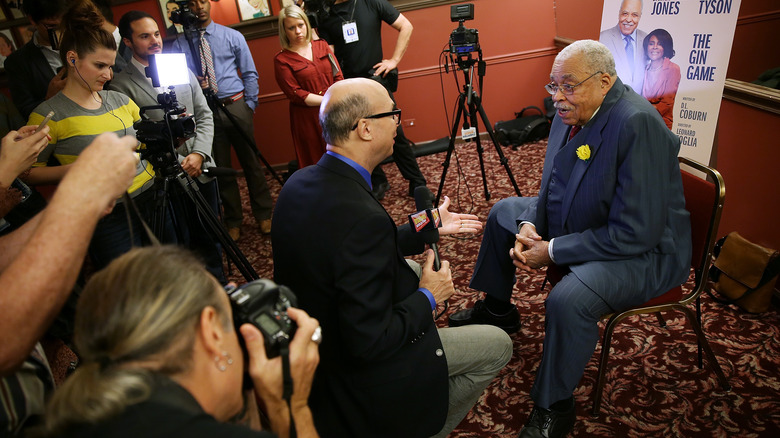The Untold Truth Of James Earl Jones
Few actors are associated with characters as iconic as Darth Vader, and even the handful of people who still maintain they haven't seen a "Star Wars" movie have heard that deep, rumbling voice coming out of that objectively terrifying mask. Still: There's so much more to him.
Jones has a seriously impressive 187 acting credits to his name, according to IMDb — and that's as of his 2021 appearance in "Coming 2 America." Along with numerous appearances in shows like "The Big Bang Theory," "House," and "Two and a Half Men," he's also been a mainstay of the stage for years. Playbill lists his stage credits, and they include iconic productions like "The Great White Hope," "Of Mice and Men," "Othello," "Cat on a Hot Tin Roof," and "You Can't Take it With You." Yet, they're all a far cry from starring in one of the biggest sci-fi movies of all time, as one of the most iconic villains of all time. Bottom line? He's done it all.
Born in Arkabutla, Mississippi in 1931, Jones has been in the entertainment world for decades. He's seen a lot and done a lot, so let's look past Darth Vader into what you probably don't know about this icon of stage and screen.
James Earl Jones never really knew his famous father
By the time James Earl Jones was born in 1931, the Los Angeles Times says that his father, Robert Earl Jones (pictured), had already abandoned his mother. At the time, the elder Jones was working as a sharecropper, left his little Mississippi-based family, and headed to Memphis. After working on the railroad for a while, he headed north again, with the idea of becoming a prizefighter.
While James grew up in Mississippi and then Michigan (via The Guardian), his father spent a brief stint working as boxer Joe Louis's sparring partner, then headed to New York City and got a job with the Works Progress Administration. After the youth group Robert was in charge of was recruited to be in a Langston Hughes play, he got his foot into the door of the industry that would make his son famous. The Guardian would later call Robert "a living link with the Harlem renaissance." His career stalled during the 1950s, but he continued to act into the 1990s (via IMDb).
Father and son were estranged for much of their lives, although when it came time for James to head to New York City, they did live together for a time. Reasons were purely practical: "It was too late to get to know him as a father: if you don't learn that from the beginning, there's no way to catch up. It took us a time to accept ... we could be friends."
A childhood trauma would go on to shape the rest of his life
For his earliest years, The Guardian says that James Earl Jones lived with his maternal grandparents in Mississippi. There were 13 people in the house, and a brief attempt was made to have Jones go live with his paternal grandparents, instead. He was having none of that, though, and stayed right where he was.
It wasn't long before the whole family moved to Michigan, and he would later tell The Toronto Star that he was living there when he experienced a traumatic event that would change his life. The 12-year-old Jones and his family were living on a farm, and it was one winter's day when his uncle had a seizure. He recalled: "I'd never seen anything like it and it terrified me." His grandmother was there, too, telling him to go get help. Jones remembered running: "I finally got to a store that had a phone, but I couldn't speak. All I could do was stutter. My uncle's life was in my hands and I couldn't speak. That was the beginning."
Jones doesn't talk much about the grandparents who raised him, but when he told The Washington Post about Maggie and John Henry Connolly, the memories were affectionate — particularly for his grandmother. When he started performing on stage, he remembered with a laugh: "So, she was my best audience."
James Earl Jones hates his iconic voice
Some voices are powerful enough to send chills down the spine of anyone who hears them, and the voice of James Earl Jones is definitely one of those. And that's why it's so weird that he hates his own voice.
He was on The Dick Cavett Show in 1995 and was asked if he ever did the Darth Vader voice in public. He'd only done it once: While traveling cross-country, he picked up the CB radio and started talking. "Freaked a lot of people out," he said, and it was then he decided he probably shouldn't do that. As Cavett turned the conversation to his iconic voice, Jones was quick to point out that no, he didn't think it was anything special. It was quite the opposite, and he explained: "I have no presumptions and no arrogance about my voice. You might think I might be in love with my voice, I'm not. It would be the most unfaithful lover I've ever had, because it fails me often. ... I can't string ideas and words together that well."
In 2010, he spoke with the Mail on Sunday, and explained that not only had he stuttered for the majority of his life, but he also suffered from severe sinusitis, which necessitated the frequent use of inhalers and nasal sprays. He recalled that his stutter was so bad as a child that for around eight years, he lacked the confidence to say anything at all.
He had complicated feelings on his military service
James Earl Jones had been in a few television series and documentaries, notes IMDb, but his big break came in 1964 when he was cast in Stanley Kubrick's "Dr. Strangelove or: How I Learned to Stop Worrying and Love the Bomb." In 2004, he wrote a retrospective piece on working with Kubrick and co-star George C. Scott for The Wall Street Journal. In it, he wrote that it was during talks over the dinner table that Scott made it quite clear that he was all for American military action in Vietnam, but Jones wasn't so sure. He wrote: "I believed some wars, like World War II, are justified and necessary. But I was not in favor of fighting in Vietnam."
At the time, military service wasn't unknown to Jones. During the Korean War, he served in the "first fully integrated officers corps in U.S. military history." But he'd also learned that even though the military was becoming integrated, there were still plenty of people who still felt that wasn't the way things should be. "There were fellow officers I encountered ... who couldn't quite bring themselves to shake my hand," he recalled.
The combination of his military service and his experiences with being "treated like second-class citizens" gave him a unique perspective. He explained: "I was no patriot, but ... I was a citizen, and ... I planned to wear my uniform ... and do my duty as a soldier."
He was cast in his first movie because he was Black
In 1995, James Earl Jones appeared on The Dick Cavett Show, and explained how he got his big break. Stanley Kubrick, he explained, was attending a performance of Shakespeare in the Park, in order to see George C. Scott — who he was already eyeing — at work. Scott was playing Shylock in "The Merchant of Venice," as Jones was playing the Prince of Morocco. What happened next was both cringey and fortuitous. "This is not verbatim," Jones explains, before continuing: "But he said, 'I'll take the Black one, too.' I will not accuse Kubrick of saying that, but that's essentially what the thought was."
Kubrick's goal for his "Dr. Strangelove" B-52 crew was to have all ethnic groups represented, and he discovered Jones alongside George C. Scott. "And that's how I got to be the Black one."
Jones later wrote (for The Wall Street Journal) that he had been attracted to the role of the military figure who questioned whether or not they should really be nuking another country, and regretted how the role evolved as the film turned into more and more of a satire. He also noted that while he felt fortunate to have worked with Kubrick and that he was "unfailingly polite," he also "ran his set more like a dictator than a director."
There were only two things that kept him going
For every big star, there are countless people who tried to break into the entertainment industry and failed. According to what James Earl Jones told The Guardian, he was very, very close to giving up.
His father had already warned him that it was a profession that anyone should ever only attempt to get into because they loved it, and Jones said: "That was good advice." Still, just a few years into living in New York City and studying drama, he was ready to throw in the towel. There were just two things that kept him going.
The first came while he was performing in a stage version of "Of Mice and Men," and it was an incredibly honest assessment by his father. "He said, 'You can act.' He didn't say, 'You were great, or 'You've got potential.' Just, 'You can act.' Father to son, that's all I needed to hear." The second thing, he said, was being cast in the 1968 film "The Great White Hope." It was then that he realized he just might be able to get enough major roles to bring home a paycheck and actually support a family, and not just live in an apartment with his father for the rest of his life.
He felt he needed to defend his actions during the civil rights movement
James Earl Jones was just finding his stride as an actor in the 1960s, and it's no secret that at the time, there was a massive social upheaval going on in the U.S. It was much later — in 2013 — that Jones spoke with The Toronto Star, and said that he'd often been asked as to why he didn't lend his voice to the civil rights movement.
Even through the lens of hindsight, Jones said that he absolutely stood by the decision made by his younger self, and would have made the same decision again. He explained: "I'm sure a lot of Black people thought I was ... shirking my responsibility, but I look at it this way: Anybody can carry a picket sign, but I think you should be able to articulate what that sign means. At the height of the civil rights crisis in America, a lot of us weren't sure what was really going on. That's why I wasn't a spokesperson."
Instead, Jones says that he has always chosen to make a statement through his work, and the characters that he plays. Rather than getting out on the street and demonstrating, he said that he preferred to choose characters with beliefs similar to his own and speak through them. For a lifetime stutterer, it makes sense: Characters, after all, can sometimes articulate what the actor can't.
He had some input into Darth Vader's voice
James Earl Jones is, of course, perhaps most famous for giving Darth Vader his voice. When he spoke to the American Film Institute about it (via FarOut Magazine), he said David Prowse was hired for his impressive stature, but George Lucas found his voice to be too much that of an ordinary human.
"It was a very effective voice," Jones recalled, "but George thought he wanted a, pardon the expression, 'darker' voice, so he hires a guy born in Mississippi, raised in Michigan, who stutters, and that's the voice and that's me."
While Jones says that he was left to try to figure out exactly what the voice was going to be, he had quite a bit of guidance — Lucas, it turned out, knew just what he wanted. He told Jones to include minimal inflection, and to make it as low and deep as possible (via The Toronto Star). While Jones says that he was happy he could go so deep without losing the clarity of what was being said, he also said that he had a very different idea of what Vader should sound like. He campaigned for a voice that he thought was "more interesting, more subtle, more psychologically oriented," but Lucas put his foot down.
He has some surprising favorite roles and poignant favorite moments
Not all roles are created equal, and in 2013, James Earl Jones talked to The Toronto Star, and looked back on some of his favorites. First was "Othello," which he said was particularly important to him because it was one of those roles that was something of a rite of passage. Add in the chance to portray exactly what it was to be an outsider, and it was a meaningful piece. He also cited "The Great White Hope," for allowing him to portray the country's love-hate relationship with Black boxers, "Fences," for taking a long look at what it's like in Black neighborhoods, and "Cat on a Hot Tin Roof" for the opportunity to show that just because certain parts have been traditionally played by white actors, that doesn't mean it always has to be like that.
He also cited "Field of Dreams," saying: "I just knew that picture was going to be special. You can't define why. You just feel it."
And the moment he was most proud of? That, he said, came when he was approached by a pair of Air Force pilots who had been deployed during the Gulf War. They told him that when they heard his intro on CNN, they "knew they were safe." He said: "I was happy to be identified with the idea of soldiers being home."
He has some surprising thoughts on television watch dogs
Every so often, something airs on television or gets included in a movie that's so outrageous that a ton of people need to complain about it, and tell other people that it's not the sort of thing they should enjoy. James Earl Jones had thoughts about those people.
Way back in 1980, he spoke with The Washington Post. At the time, acting opportunities for Black actors were what they described as projects about slavery, housing projects, and in comedies, and Jones had an interesting take on it. "They might not be of the best quality," he explained, but they do prove to young Blacks that there is a place for them, a job for them. It's an energy that will evolve. If you kill off that form, you kill off that energy." At the same time, he condemned groups for being too consumed with saying what wasn't good, without giving any input or support to "what's better," and added: "It's too easy to censor. The hardest thing is to pick up a camera and do it better."
Fast forward to his 2013 interview with The Toronto Star, and Jones had some similar views. When asked about playing characters that have traditionally been white — like Big Daddy from "Cat on a Hot Tin Roof" — he said: "You've got to play the culture, not the color."
James Earl Jones has a surprising favorite when it comes to jobs
James Earl Jones was getting ready to take to the stage for "Cat on a Hot Tin Roof" when he talked to The Guardian in 2009, and told them that he considered himself a "journeyman actor," who would take whatever parts came his way that he found interesting. And, he added, "I love doing commercials! Usually, they have enough money that they can take time and photograph it well." At the time, he did have a bucket-list request, too: A role in a British commercial, because European commercials are, without a doubt, way better than their American counterparts.
That's not to say, however, that there aren't some great American commercials, and Jones has been in some of the best. We're talking about the Sprint commercials where he and Malcolm McDowell pay tribute to conversations that have him declaring — with all the gravitas of Othello — "Totes mcgotes!"
Yahoo! reached out to him to see just how Sprint got him to do it, and it turns out, all they needed to do was call him. He confirmed that he hadn't known any of the slang that he was given to say — and didn't continue to use it — and while he was concerned younger viewers might think he was making fun of them, once the director assured him they were going for a serious, almost classical interpretation of everyday conversations, there was no looking back.
James Earl Jones made a special wish on his 90th birthday
James Earl Jones is one of the oldest celebrities working in Hollywood, and when he turned 90 in 2021, he spoke with USA Today on what the big 9-0 meant. He said that it was a chance to look back at his career, and remember that he's "proud of my work and my accomplishments." He added that he was "feeling fantastic and grateful," and that he treasured the wisdom that age brought. He was also, he said, looking forward to indulging in his favorite dessert: strawberry shortcake.
Jones turned 90 in mid-COVID pandemic, and he had also just been working on "Coming 2 America." Cast and crew alike broke into applause when he went to the set for the first time, and he wrote that he was "honored," and "touched by the reaction." Fortunately for fans, he also said that he has no intention of slowing down or retiring, and that he was grateful to be able to keep working — and he would, for as long as he could.
He also had a very specific wish that he was going to be making as he blew out the candles on his birthday cake. "In order for us to heal and move forward, we need to learn to love and respect each other. That will be my wish..."
